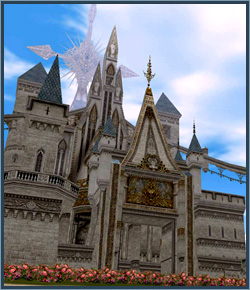The castles of Aden and Elmore have a direct influence on all of the villages and inhabitants of the world of Lineage II. Find out more about the intricacies of controlling a castle. |
Most of the necessary administrative tasks can be handled through the Chamberlain, who remains close at hand to the throne. Only the lord himself may issue commands to the Chamberlain. He offers status reports of the region, handles tax rates and changes, oversees manor seed sales and purchases, controls the Castle Vault, collects upcoming siege information, manages castle defenses and structural upgrades, and provides Certificates of Approval to allow allies of the lord to join the Dawn cabal without cost. Tax rates affect the sales price of all NPC stores within the controlling region of the castle. They can be set to between 0% and 15% of the base sales value. Although it may initially seem like raising the tax rate to 15% would garner the most profit, increased taxes can drive away potential buyers and cause them to buy their goods in less taxed regions. It also alienates potential allies and could possibly lead to clans allying to oust the ruler, especially in regions that sell items unique to that castle region. Setting taxes at 7% to 10% is often considered prudent and is standard across Aden. Proper administration of manor seeds is also vital, as it provides much needed materials to citizens and special items and equipment to the castle-owning clan. Seeds are purchased by the lord and sold to the populace by Manor Managers within the region. Farmers purchase these seeds to use on monsters, which returns a special crop seed, sellable back to the Manor Manager for materials. In return, these crop seeds are collected by the lord and exchanged for special items. Through careful planning, the lord determines which seeds are the most popular for citizens and which will net the largest reward, providing a sufficient number of each. The Castle Vault contains all money obtained through taxes, and is used for the purchase of manor seeds. The castle lord may withdraw or deposit funds from the Vault at any time, but should be conscientious about managing the castle funds. The Chamberlain also assists in the defense and reinforcement of the castle in between sieges. He can open and close any or all of the castle's gates, banish all outsiders that do not belong to the castle-owning clan, and oversee the upgrade and reinforcement of castle gates, walls, and siege traps. In addition, he also provides special certificates that can be used to recruit allies into the Army of Dawn and help prevent revolutionaries from weakening their defenses through the Seven Signs Quest. Finally, mercenaries may be purchased through the Mercenary Manager. These mercenaries are positioned throughout the castle immediately before a siege and will defend their positions with their lives. In addition, the Wyvern Manager stationed at the top of the castle allows a castle lord with a powerful Strider pet to mount the fearsome flying Wyvern and assert his lordship over both domain and battlefield from the sky. The life of a castle lord is fraught with challenges but offers tremendous rewards for those that manage their domain effectively. A castle owning clan must be strong and organized, fighting dissent within and without, with a focused and dedicated leader. Ultimately, control of a castle is the surest sign of authority throughout the land, but only proper administration of the castle and manor will leave a legacy that truly stands the test of time.
|



 Controlling and managing a castle can be a daunting but rewarding task in Lineage II, requiring organization and foresight. Aside from the intense diplomacy, political savvy and military power required to take the castle and protect it, there are many tools and abilities bestowed to castle lords that require constant attention and proficient management.
Controlling and managing a castle can be a daunting but rewarding task in Lineage II, requiring organization and foresight. Aside from the intense diplomacy, political savvy and military power required to take the castle and protect it, there are many tools and abilities bestowed to castle lords that require constant attention and proficient management.